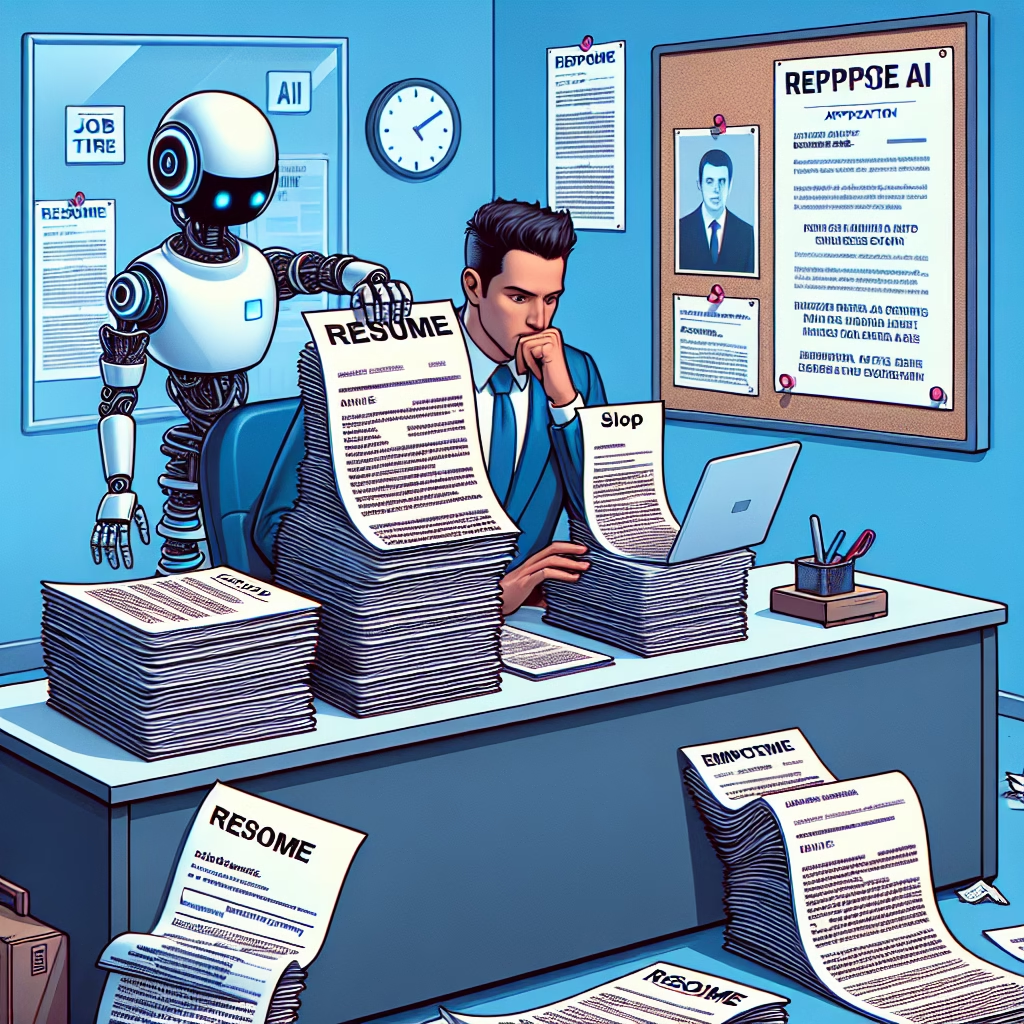The Rise of AI-Generated Job Applications Is Flooding Recruiters With “Slop”
AI in the Job Market: A Double-Edged Sword
Artificial Intelligence has undeniably transformed the way we work and communicate, from speeding up tasks to generating entire essays or marketing campaigns. But in the race to leverage AI for everyday activities—like job hunting—we’ve begun to see unintended consequences. One emerging trend is the mass production of low-quality, AI-generated job applications, which recruiters are now labeling as digital “slop.”
Job seekers are increasingly turning to AI tools like ChatGPT, Jasper.ai, and other language models to craft cover letters, tweak resumes, and even write follow-up emails. While it may save time, this shortcut is overwhelming hiring managers and recruiters with generic and uninspired content.
What Is AI “Slop” and Why It’s a Problem
“Slop”—a term coined by internet users to describe low-effort, AI-generated content—is now making its way into the professional space. In the context of job applications, slop refers to content that:
- Lacks personalization or originality
- Fails to address specific job requirements
- Is clearly written by a machine, not a human
- Includes generic phrasing and vague buzzwords
This surge in AI-generated slop is creating a frustrating experience for those on the other end of the hiring process. Recruiters report spending more time than ever filtering out these low-effort applications, adding friction to a process that already demands time and discernment.
How AI Is Changing the Application Landscape
In theory, AI tools should help candidates present their best selves. With proper prompts and some human touch, these platforms can enhance spelling, grammar, tone, and structure. However, many job seekers are skipping this crucial final step: human input.
Instead, they rely entirely on AI to generate:
- Generic cover letters without insight into the company’s mission or culture
- Resumes packed with buzzwords but lacking meaningful accomplishments
- Canned responses for follow-up emails and thank-you notes
The result? A tidal wave of copy-paste content that reads the same across thousands of applications.
Recruiters Are Raising the Red Flag
Hiring professionals are voicing concern over this trend, expressing that sifting through these robotic applications wastes valuable time and energy.
Real-World Reactions
Social media platforms like LinkedIn are filled with posts from recruiters detailing the influx of what they call AI-generated “junk.” Some share screenshots showcasing laughably vague language such as:
- “As a passionate leader in innovation and collaboration…”
- “I bring synergy and dynamic strategies to fast-paced environments…”
These phrases could apply to virtually any role, in any industry—which misses the entire point of a job application: to show why a specific candidate is uniquely suited to a specific role.
Filtering Tools Aren’t Keeping Up
While applicant tracking systems (ATS) can filter resumes by keywords, they’re not equipped to detect whether something was written by a human or an AI. This means slop often sneaks past initial filters and lands directly in front of hiring managers.
Why Quality Still Beats Quantity in Job Applications
AI is supposed to level the playing field—but only when used thoughtfully. The core of a compelling job application still remains human insight, experience, and authenticity. Here’s why quality continues to reign supreme:
- Recruiters favor personalized applications. Those that mention the job title, company name, or specific product/service stand out quickly.
- Hiring is about connection. Employers want to hire people, not bots. Demonstrating your personality and voice matters.
- AI lacks context unless trained thoroughly. Many AI-generated resumes neglect key job-specific skills or overgeneralize.
How Job Seekers Can Use AI Responsibly
Using AI in your job search doesn’t have to be a recipe for disaster. When done correctly, AI can be an effective assistant—not a replacement for personal effort. Here’s how job seekers can make the most of these tools:
Best Practices for AI-Assisted Applications
- Edit AI-generated content. Always read and manually tweak the output to suit your personality and the job’s needs.
- Add specific details. Mention why you’re excited about that company or how your experience matches their team goals.
- Use AI as a starting point. Let it help you frame ideas, structure letters, or proofread—just don’t send results unedited.
- Keep authenticity in your tone. Write as if you’re speaking to a hiring manager, not a robot.
What Employers Can Do to Combat the Slop
While job seekers carry the burden of presenting themselves effectively, employers can also take steps to manage the flood of AI-generated applications.
Tactical Changes Companies Can Implement
- Include “human-check” instructions. Ask applicants to include a line about why they specifically want to work at your company.
- Incorporate writing tasks that test creativity. These assignments are harder for AI to fake convincingly.
- Use AI-detection tools with caution. Don’t rely solely on software to weed out bad applications—look for signals of effort and relevance.
The Bottom Line: A New Era Calls for New Etiquette
We’re entering a new chapter in the job search process—one where artificial intelligence can be a powerful tool or a dangerous crutch. The increasing volume of AI-generated “slop” is a warning sign that tech-savvy candidates shouldn’t ignore.
The future of hiring will not be about who uses AI the most, but who uses it the most effectively. It’s still those thoughtful, well-crafted, and personalized applications that cut through the noise and land interviews.
Final Thoughts
AI tools offer tremendous opportunities to job seekers willing to apply them judiciously. But as they become more commonplace, the bar for what constitutes a good application is also rising. Creating high-quality, sincere applications will ultimately remain the best strategy for any serious job hunter.
So, the next time you’re tempted to copy-paste that AI-generated cover letter—think again. A few thoughtful sentences could be the difference between a recruiter tossing your application in the slop pile or scheduling that long-awaited interview.
Keywords:
- AI-generated job applications
- ChatGPT job hunting
- AI slop in recruiting
- job application tips
- how to use AI for resumes
< lang="en">







Leave a Reply